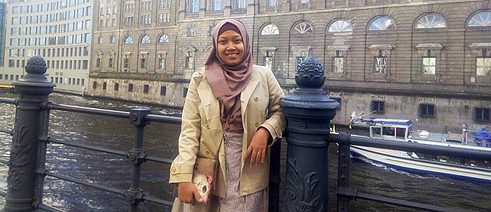Visitors’ Journey
“The open congregations made me proud”

The Islamic scholar Irma Wahyuni visited Germany for two weeks for a visitors’ journey organised by the Goethe-Institut for Muslim intellectuals from Indonesia. Here, she speaks about refugees, radicalism and individualism.
For almost two weeks, the group of about fifteen Muslim intellectuals from Indonesia travelled through Germany. They met other Muslims in Göttingen, Frankfurt and Berlin, talked with Islamic scholars, visited museums, and in mosques in Neukölln learned what everyday life in Germany is like for Muslims. In the interview, Irma Wahyuni tells us that this journey altered her image of Germany.
 Visit at the Federal Foreign Office.
| Photo: Nati Sajidah
Ms Wahyuni, you’ve spent two weeks in Germany now. What impressed you the most?
Visit at the Federal Foreign Office.
| Photo: Nati Sajidah
Ms Wahyuni, you’ve spent two weeks in Germany now. What impressed you the most?
There was a great deal. It was not only about religion but also about how Islam is perceived in society here. For example, we spoke in depth with academics about the compatibility of Islam and democracy. I also found it interesting to learn how the majority society deals with new influences such as Islam and how it is also viewed as negative by some.
You also visited refugee centres. What did you learn from the refugees?
We first learned that the people had come to Germany for a variety of different reasons. For example, some were forced to fight in an army. They said the most difficult thing for them is the German language – and even if they are slowly learning to speak German, it is hard for them to get to know Germans.
What did the imams in German mosques have to say?
During our visits to the mosques, I found it especially interesting that they always open the prayer room for non-Muslims, as well. They talk with the guests, no matter their faith. This made me proud as a Muslim. They don’t hide.
You also visited the Ibn Rushd-Goethe Mosque, a very special project. How was it for you?
Yes, I have never seen anything like it before. They are trying to set up a lot of new rules. The problem is that the word “radical” encapsulates so much. There are certainly people who would describe the operators of the Ibn Rush-Goethe Mosque as radical. I would prefer to use the word “courageous.” Women and men praying together is something new. I’d say they’re trying to build a bridge.
Indonesia is a Muslim country. Do you experience it as open, as well?
Although Indonesia is a predominantly Islamic country, we also see ourselves as multi-ethnic. This can, of course, lead to conflicts, but this must be reflected in political practice. I have many friends in Jakarta who are Hindus or Christians, or who follow the various movements in Islam: Shiites, Sunnis, Ahmadiyya. And there are also liberal congregations in Jakarta; it is an open and tolerant city.
Has your image of Germany changed?
Before I came here, I had always thought that individualism is very important here. Everyone relies only on himself. But individualism can also be something positive. The people here are also concerned with how they can improve their coexistence.